- Last Updated Jul 29, 2025Published Date Jan 13, 2025
Struggling to get your website on Google’s first page?
Before making a purchase, more than half of all consumers go to Google to search for it. Search engines use such search terms or keywords to get relevant results. If your website does not appear on the top page of search results, it will not get traffic.
You could have the best content, but if it’s not optimized with the right keywords, Google won’t show it to the people searching. Keywords are the bridge between your content and your audience. And guess what? Most businesses miss the mark. This blog will guide you through proven ways to find keywords that actually get clicks, leads, and conversions.
So, you must understand the importance of SEO keyword research. But how to choose keywords for SEO? What keywords are most effective for your company?
In this blog, our SEO expert in kolkata will discuss how to find keywords for SEO using keyword research tools. Learn about different sorts of keywords and include them in your content.
The goal is to increase the number of targeted visitors to your website.
Go through our 9 recommendations on how to find keywords for SEO below.
How to Find Keywords for SEO
Let’s be real. Knowing how to do keyword research is a game-changer. It’s not just about tossing in random search terms and hoping for the best. It’s about being smart and strategic.
Start with a seed keyword that’s directly related to your product or service. Think simple and practical. What would your customer type into Google when they’re looking for what you offer? That’s your foundation. For example, if you sell handmade soaps, your seed keyword could be "natural soap" or "handmade skincare."
Once you have your seed keyword, enter the keyword into a research tool. You’ll instantly get access to a bunch of relevant keyword ideas, including high search volume keywords, long-tail keywords, and even related search terms people are actively looking for. This is where the real magic begins — you start to see what your audience truly wants.
But don’t just pick keywords based on search volume. That’s only one part of the puzzle.
You also need to consider search intent, which means understanding why someone is searching in the first place. Are they looking to buy, learn, or compare? This helps you align your content to what the searcher is expecting to find.
Next, check the keyword difficulty score. This tells you how competitive the keyword is. If it’s too competitive, it might be harder for your site to rank, especially if your domain is new. Targeting low-to-medium difficulty keywords often yields better results, faster.
Then evaluate the business potential. Ask yourself — will this keyword attract people who are likely to buy or take action? Some keywords bring traffic, but not customers. You want keywords that not only attract visitors but also align with your sales funnel.
To stay organized, use keyword clustering. This means grouping different keyword types that share a similar topic or intent. For example, cluster keywords like “best running shoes,” “affordable running sneakers,” and “running shoes under $100” under one content theme. This strategy builds topic authority and helps your page rank for multiple search queries without sounding repetitive or forced.
And finally, don’t forget to refine your keyword list regularly. The right keywords for your website are not just those with high volume, but those that actually resonate with your audience, support your brand goals, and match what you truly offer.
Finding the right keywords isn’t just a task. It’s a strategy. And once you get it right, everything else in your SEO process becomes more effective.
Read This: How To Find Low Competition Keywords For SEO?
Finally, some ideas on how to find keywords for SEO
Many people say that it is very difficult to choose keywords for SEO. But it isn’t true! Just know the right approach and invest your time.
You will only do SEO keyword research on the following criteria:
- The traffic potential is great.
- Have a good business potential
- Develop material that is relevant to search intent.
- Ensure to have a good possibility of ranking.
After finding the perfect keywords that suit your business requirements, sort them according to their potential. So, you can achieve the desired ranking on SERP.
As an SEO expert in Kolkata, we've found that selecting the appropriate keywords has a significant influence on the ranks of your company's website.
Importance of Keyword Relevance and Grouping
Here’s something often overlooked — keyword relevance and proper grouping.
You might find the keywords with great volume, but are they really keywords with the highest value for your business? Are they aligned with your content goals?
That’s why you need to focus on:
- Keywords and keyword variations (e.g., “digital marketing”, “digital marketing strategy”)
- Keyword clusters — a group of closely related terms
- Content mapping — assign each keyword with business potential to a dedicated page or blog post
Also, check which keywords related to your niche already bring you traffic. Use Google Analytics or Google Search Console to guide this.
This approach will strengthen your website structure, improve user journey, and boost your chances of ranking across multiple terms.
Recommended: What is Orphaned Content in SEO? How to Easily Find and Fix Orphan Pages
How to choose keywords for SEO?
1. Evaluate Search Intent
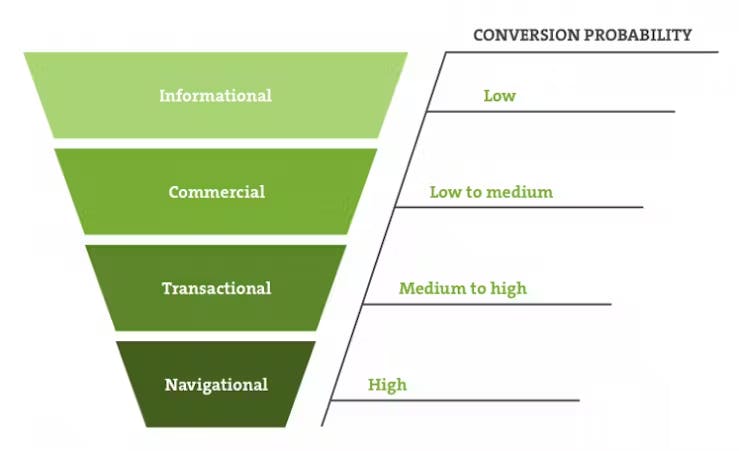
Search intent informs what keywords to use, depending on why people search. We classified them into three types:
- Navigational - the user wants to access a specific website.
- Informative - doing a study on a certain issue
- Commercial - a strong desire to buy
To choose keywords for SEO, you must think like your consumer.
SEO keywords example like 'Buy budget smartphone' inquiries differ from 'smartphone battery charging tips’ queries. The first is a commercial keyword, while the second is informative. So, choose according to your business.
For informative searches, provide some original content using that keyword. Of course, connect that blog piece to your product sites or contact forms. Commercial intentions are the simplest to concentrate on, but they are also the most competitive.
With Google's latest Search Generative Experience (SGE) rolling out globally, search intent is more nuanced than ever. AI-powered answers prioritize topic relevance and user engagement. Make sure your content serves intent and keeps readers on your page.
Must Read: What Is a Nofollow Link? (And Why It Matters for Your SEO Strategy)
2. Recognize Different Types of Keywords
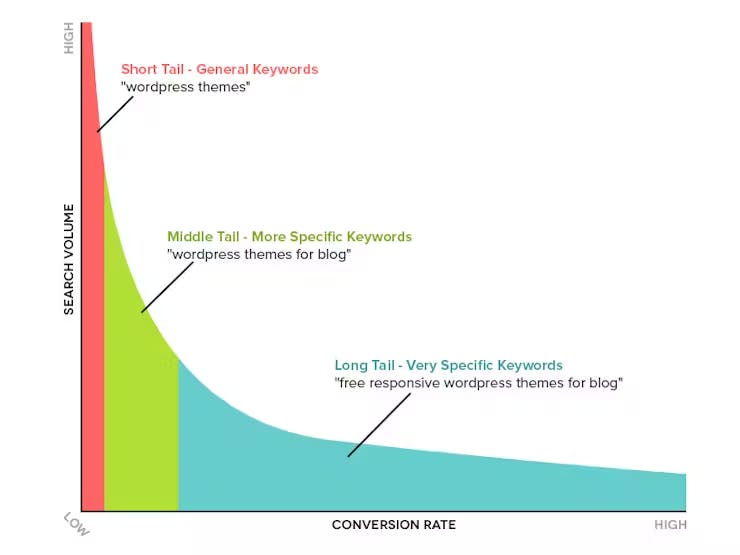
Before you begin keyword research, consider the three major sorts.
- Keywords in the title
- Keywords for the body
- Long tail keywords
Head keywords are one or two words long and produce a slew of search results. Consider an SEO keywords example "birthday cards," which Google matches with a massive 1.17 billion pages.
Body keywords are typically two to three words long. Google searches for 'friend birthday cards' now yield 3 million results.
Long tail keywords are phrases that are four words or longer. They give targeted results so many people use them while searching.
Voice search is driving a rise in conversational long-tail keywords. Think: "What is the best smartphone for under 15,000 in India?" These intent-rich phrases are easier to rank for and deliver better-qualified traffic.
Therefore, ranking high for head keywords is really challenging. However, focusing on the long tail keywords is both simpler and more fruitful. Hiring seo services kolkata can help you in discovering the best keywords for your website.
Recommended: What Is Dofollow Link? How Do Dofollow Backlinks Affect Site Rankings?
3. Keyword Research Tools
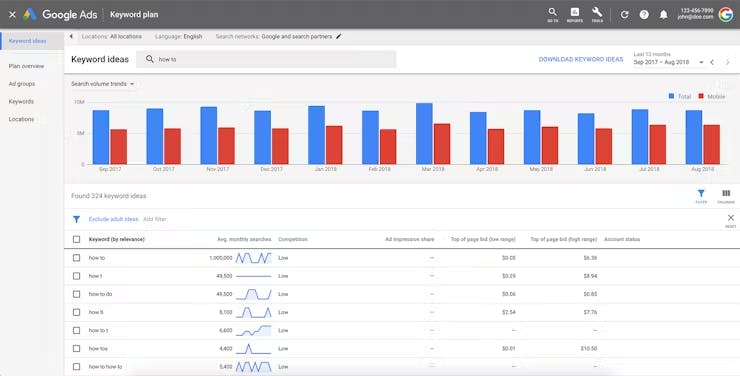
Knowing the best keyword research tools is one of the finest strategies of how to choose keywords for SEO.
For SEO keyword research, you can use Google Keyword Planner. It is a free tool for determining which keywords work and which do not.
It is available via the Google Ads network. Simply sign up for an account and use the planner to insert a keyword. The results show the search volume, relevant terms, and traffic figures for that keyword.
You may use keywords that function effectively in your PPC campaigns.
Moz Keyword Explorer is an excellent alternative to Google keyword planner.
Enter a term or site address and sign up for a free account to run up to ten searches. It gives monthly traffic figures and the difficulty of ranking for that keyword. The comprehensive report covers a SERP analysis and organic CTR.
- Keyword Surfer (Chrome extension for instant keyword data)
- AlsoAsked.com (for mapping questions users search)
- Ubersuggest (free alternative with competitive analysis)
4. Use LSI To Refine Your keywords
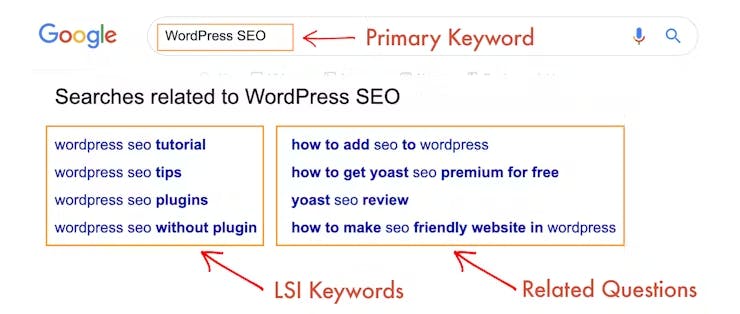
Latent Semantic Indexing, abbreviated as LSI, is a complicated way of describing word association. Google uses LSI to generate relevant results based on context.
To make it simple, go to Google and begin typing a term.
The autocomplete list offers results depending on the terms you entered. However, as you continue to type, those sentences will alter. This is because Google discovers more alternatives as your long-tail keywords search continues.
Related searches will also appear at the bottom of the SERP. To limit your keyword choices, use these semantic or similar phrases.
Latest Insight: Google now uses BERT and MUM algorithms to interpret context, not just keywords. So use synonyms, variations, and related subtopics in your content naturally.
5. Locate Terms with High Search Traffic Potential
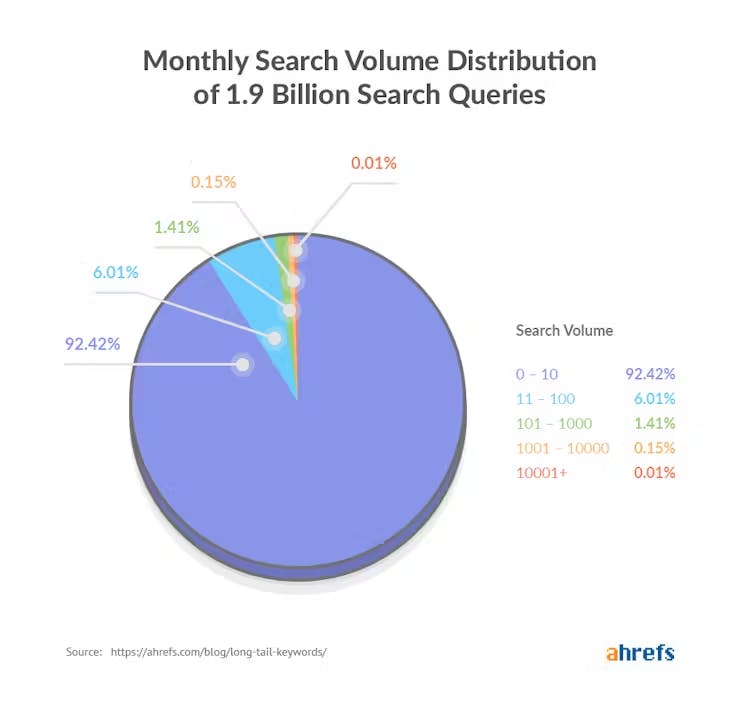
There's no meaning in targeting a term unless people are actively looking for it. Because ranking high for a term that no one is looking for will not get you any traffic. It just does not have any traffic potential.
For this, analyze the search volumes of that term in your keyword research tools.
Keywords with larger search volumes have a better traffic potential. However, ranking first for certain phrases generates much more traffic than you'd expect from the search volume.
So, never depend only on search volume when you choose keywords for SEO with traffic potential. Examine the traffic of the top-ranking page to have a more accurate approximation of the topic's overall traffic potential.
Focus on topical clusters instead of single keywords. A single high-ranking page now drives traffic from hundreds of related keywords, thanks to semantic indexing.
6. Keywords Should Also Have Business Potential
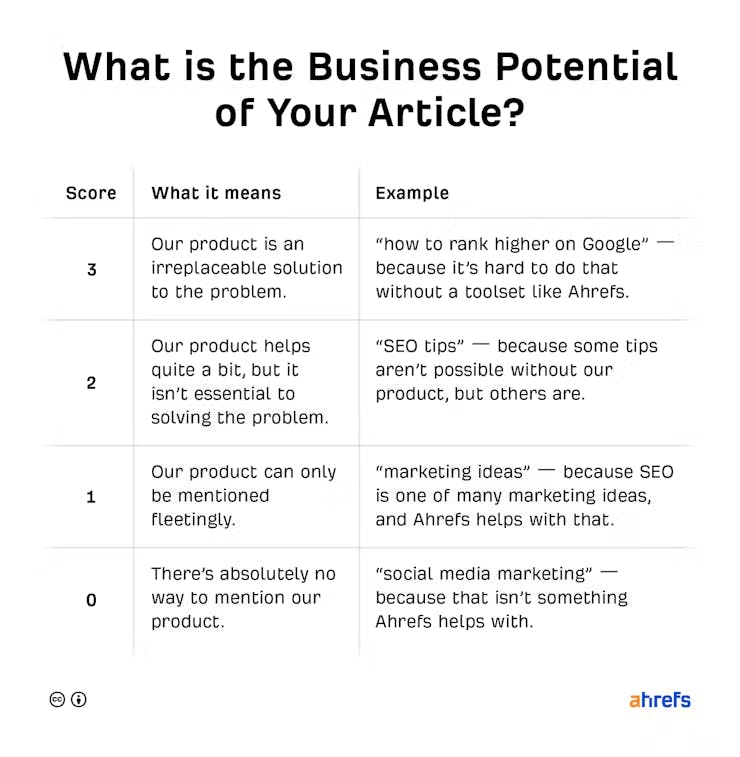
Business potential means how profitable ranking for a keyword ranking will be for your company.
If the search goal is for an e-commerce product or category page, the solution is simple. If your business sells products, choose keywords that have commercial potential.
However, if the search aim is for a blog post or other useful material, the situation becomes a bit trickier. You must assess if you can naturally sell your product or service in that article.
Remember that picking keywords with commercial potential does not imply that your content must be salesy. The best seo agency in Kolkata chooses keywords with high business potential so that any pitches or references of your product or service in your content are truly valuable and assist your audience in solving their issue.
7. Create Your Buyer's Journey Plan
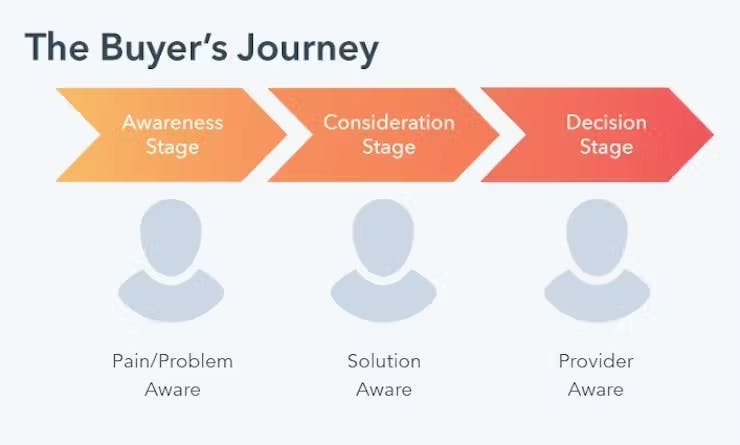
Consider the usual path that a prospective consumer takes from learning about your product to placing their first purchase. Most customers will not make a purchase when they first hear about your website. Instead, they may go through many phases, such as awareness, consideration, and decision. In marketing, it is known as the buyer's journey.
When a prospective consumer realizes they have an issue, they are said to be aware. Potential clients at the awareness stage may not even know about your solution.
During the consideration stage, the prospective client begins to identify and explore various solutions to their issue.
The decision stage is the last step. This is the point at which a prospective consumer chooses a solution and makes a purchasing decision. Ensure consumers pick your product over competitors' offerings!
When creating content, keep your target reader and their stage in the buyer's journey in mind. That blog article may conclude with a CTA to sign up for a newsletter that contains personalized special offers in the decision-making process.
Tips: Use Google Analytics 4 (GA4) to analyze which stage users drop off. Create keyword-targeted content that re-engages them with lead magnets, product demos, or free tools.
8. Confirm That You Can Rank For The Keyword
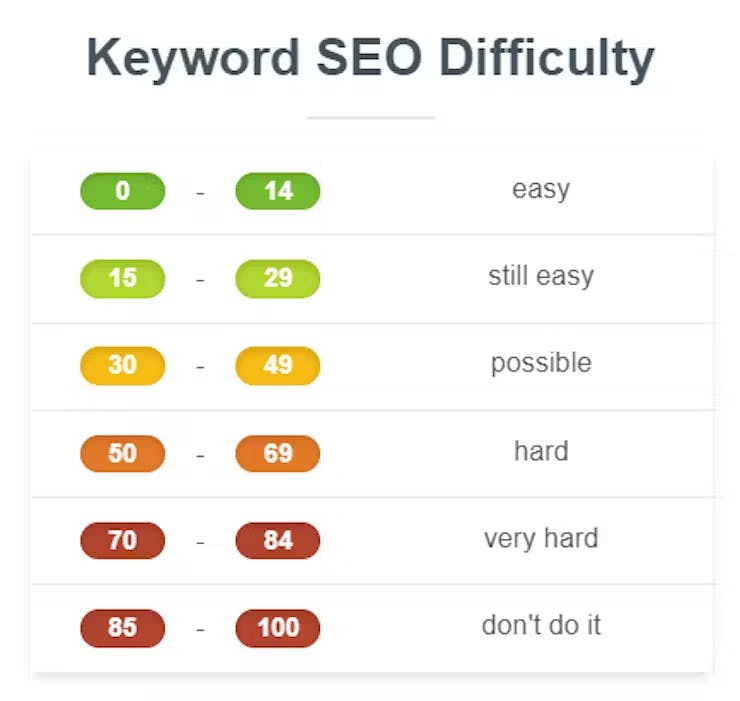
You may think anybody with enough effort can rank for any term.
However, certain keywords are more difficult to rank for than others, particularly the short to medium terms. Therefore, evaluating the ranking difficulties is an important step in how to choose keywords for SEO.
A keyword difficulty score analyzes the relative ranking difficulties of candidate keywords. This function is included in the majority of keyword research tools.
The higher a keyword's KD score, the more backlinks it is likely to need to rank on Google's first page. Also, many other aspects influence ranking difficulty. Check the number of organic results and ads.
Keywords with a KDS between 30% and 60% are moderately difficult to rank. They would often have high search volumes. Thus, when it comes to picking the correct keywords, they are your best bets, since you have a genuine possibility of competing for them.
So, while doing SEO keyword research, locate low-difficulty keywords!
9. Assign each keyword to a unique page on your website.
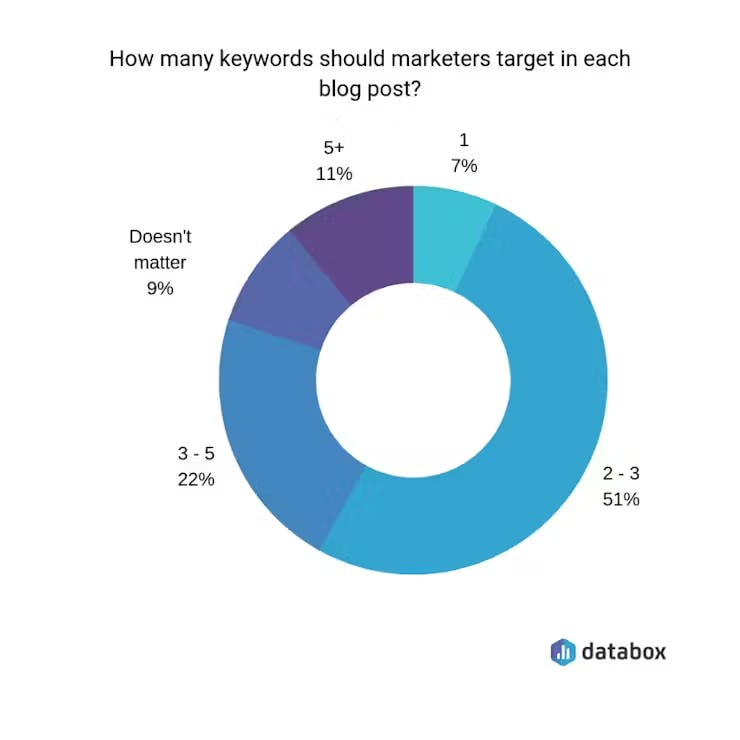
The last step is to associate each target term with a particular page on your website. A basic content plan is the greatest approach to keep your thoughts organized.
It will help you avoid targeting the same keyword on two distinct pages of your website.
It's a good idea to make sure that each of your web pages targets a separate set of keywords. In most cases, you'll want your product and service pages to target keywords with a high level of commercial intent. In contrast, your blog entries may target informative keywords. Try not to use the same term in two (or more) separate locations on your page.
Use content mapping tools like SurferSEO or Frase.io to match keywords with user intent and structure your content around semantic relevance.
Best Free and Paid SEO Tools for Keyword Research
Doing smart SEO isn’t about guesswork — it’s about having the right tools. If you're trying to find the keywords that truly matter, using keyword research tools is the best place to start.
Here’s a curated list of free and paid keyword research tools that will help you discover new keywords, measure keyword difficulty scores, and uncover the best keywords for your business.
Free Keyword Research Tools
Perfect for beginners or those testing waters before diving into advanced platforms.
1. Google Keyword Planner
A must-have. This free tool from Google Ads shows keyword search volume, traffic forecasts, and keyword suggestions. Just log into your Google Ads account to start.
2. Google Trends
Want to see when and how often a keyword is searched? This is your tool. Compare multiple terms and find seasonal patterns in search behavior.
3. Google Search Suggestions & Related Searches
Just start typing your seed keyword into Google’s search bar and let autocomplete give you ideas. Scroll to the bottom of the SERP for more relevant keyword ideas.
4. Ubersuggest
Created by Neil Patel, this is a go-to for simple keyword analysis. It’s free for basic use and gives you a quick look at search volumes, difficulty, and content ideas.
5. AnswerThePublic
Visualize real questions people are asking around your product or service. Great for discovering long-tail keyword research opportunities.
Paid Keyword Research Tools
If you’re ready to scale and dig deeper into data, these premium tools for keyword research are worth every rupee.
1. SEMrush
An all-in-one SEO platform. Track keywords, perform technical audits, create keyword clusters, and spy on competitors' keywords. It's built for serious SEO work.
2. Ahrefs
A powerhouse for backlinks and keyword research and SEO tracking. Use it to assess keyword difficulty scores, traffic potential, and site-wide opportunities.
3. Moz Keyword Explorer
A smart way to identify the keywords that offer real ranking potential. Their scoring system also helps you evaluate the business potential of each keyword.
4. KWFinder by Mangools
A clean, simple UI paired with deep keyword insights. Best for long-tail keyword research, local SEO, and refining your keyword selection based on difficulty and volume.
Use these tools to get a bunch of keywords, validate your primary keyword, understand the keyword search volume, and align them with your audience’s intent.
Whether you’re aiming for keywords with the highest traffic, or a niche long-tail keyword, these platforms show you the right keywords to target with clarity.
Choosing the right keywords isn’t just a one-time task, it’s the cornerstone of a successful, sustainable SEO strategy. By understanding user intent, leveraging the power of free keyword tools, and focusing on both traffic and business potential, you position your content to attract, engage, and convert the right audience.
As SEO continues to evolve with AI-driven search changes in 2025, it's more important than ever to focus on context, topical relevance, and user experience. Use the keyword strategies discussed here to stay ahead of the curve and ensure your website is discoverable and valuable to your ideal customers.
Start small, stay consistent, and always refine based on performance data. With the right approach, SEO keyword research becomes not just manageable, but a powerful growth driver for your business.
Start Growing in Just 3 Simple Steps
We assess your goals, craft a tailored strategy, and finally implement it so you can confidently grow your business.
Book a free consultationJoin Our WhatsApp Channel
Join our privacy friendly whatsapp channel and stay up to date with the latest news, updates, and exclusive offers. Join our community today!
Get Free AccessSolutions ❇️
Popular Gigs 📈
Tools 🛠️
- Ads Budget Calculator
- UnifyleadsSoon
- ShareUsReviewSoon
- BrandItSoon
- GrowSoon
FavFly Solutions for Your Digital Growth:
SEO Services in Kolkata | Local SEO Company in Kolkata | Digital Marketing Company in Kolkata | Social Media Marketing Services in Kolkata | WebStudio Website Development | UGC Reels Creation Services | Google My Business for Gynecologists | Google My Business for Restaurants | Google My Business Guide | Google My Business for Dentists | Google My Business for Interior Designers | Google My Business for Doctors | How Google My Business Profile Works* About Us : At FavFly, we redefine digital marketing by focusing on what truly matters: your growth. We don’t just offer services like SEO, SMM, and website development – we become an integral part of your success story, providing strategic guidance and innovative solutions that empower your business to reach new heights.











